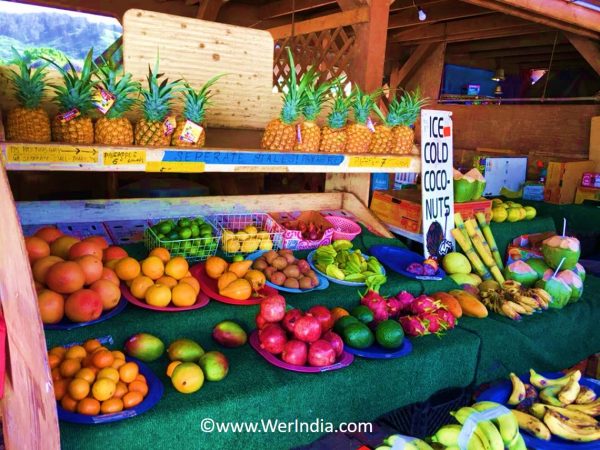
Eat those veggies and fruits available in that particular season
Our ancestors used to eat certain foods only when they were in season, things had changed to an extent where people could buy any type of food from the supermarket, irrespective of its seasonal availability. Today because of technology, all vegetables and fruits are available during all seasons. However, scientists and nutritionalists are asking us to eat what is available in that particular season. There are plenty of reasons for this.
1) Locally grown, easily affordable and hence cost is low
2) The nutrition levels of fresh, seasonal food is very high and it is proven that nutrition values goes down considerably, the longer the food stays unconsumed & stored. So, it’s a good idea to eat freshly picked fruit, or freshly harvested produce.
3) You support your local farmers and in return get good produce.
4) Supermarkets add gloss to their fruits and vegetables to keep them looking fresh and inviting. By gloss, we mean that supermarkets and huge food chains take pains to ensure that food is attractive even though it is not in season. To do this, they naturally compromise on the nutrition level of the food
5) Seasonal foods are more or less organic and if you’re going to be eating non seasonal foods, do keep in mind that they’re probably full of pesticides as well. Healthy eating goes down many notches when you give in to eating non-seasonal foods.
6) Seasonal foods are good for the environment. Not only do foods taste best when they are in season, they are far fresher since they haven’t been transported over long distances (which is why they are often picked prematurely, robbing them of their nutritional benefits).
7) Foods that are grown out of season are often sprayed with chemicals of all sorts because it requires a little bending of nature’s rules for these foods to survive the strange season in which they are brought into the world.
8) Nature has a cycle of its own for a very good reason. The foods that appear in winter are normally because they are of the heating type and keep you warm. Likewise, in summer you have cooling foods and these keep your body cool. If we revert this natural order, we’re likely to not receive any of nature’s benefits that were meant for us. What’s more, we could be doing more harm than good by eating foods that are clearly not in season.
9) The same vegetables or fruit produced in seasons in which they are not meant to be around, seem to have different nutritional values.
10) To keep produce fresh more preservatives that are added to unseasonal foods, the more nutrients they lose and give you no health benefits and we will be paying for harmful preservatives and not for nutrition when you buy unseasonal foods.
11) The very important reason to buy the seasonal fruits and vegetables is because they are full of antioxidants that are good for health. What are these antioxidants? Antioxidants fight free radicals, keep us young and keep diseases at bay.
12) Consuming season produces keeps us close to soil because we will be aware of what is happening in natures cycle.
Eating healthy is important because otherwise, you are doing your body a huge disservice. Eat seasonal and be healthy is the new age mantra indeed.
To keep yourself and your family health in good condition buy what’s available in abundance in fresh in your local market. Local markets are the indicators of fresh vegetables and fruits.
- In India:
January
vegetables :Brinjal, palak, tendli, tomatoes, cabbage, cauliflower, carrot, radish, beetroot, peas, broccoli, capsicum.
Fruits: Strawberries, grapes, guava, papaya, pomegranate, pineapple, passion fruit.
February
Vegetables:Cabbage, methi, carrot, radish, spring onion, capsicum, broccoli.
Fruits:Chickoo, musk melon, grapes, oranges, guava, papaya, pomegranate, pineapple, strawberries.
March
Vegetables :”Spinach, fenugreek, capsicum, carrot, parwal (pointed gourd), tindora (ivy gourd), pumpkin.
Fruits: Watermelon, mango — raw, Totapuri, Badami — grapes, orange, pineapple, banana, muskmelon, strawberries.
April
Vegetables :Lady’s finger, cucumber, doodhi, tendli, karela, chawli, beans, parwal, tindora, pumpkin.
Fruits: Same as March + jackfruit.
May
Vegetables :Spinach, cucumber, doodhi, karela, beans.
Fruits:Mango — Alphonso, Kesar, raw — papaya, black jamuns, litchis, jackfruit, watermelon, muskmelon.
June
Vegetables: Spinach, lady’s finger, cucumber, chawli, gawar, corn, capsicum, sweet potato.
Fruits:Mango — Alphonso, Kesar.
July
Vegetables :Same as June + round gourd, doodhi, snake gourd, karela.
Fruits:Mango — Kesar, Totapuri — cherries, peach, plum.
August
Vegetables :Same as June.
Fruits:Same as June + custard apple.
September
Vegetables :Same as June.
Fruits :Guava, papaya, pomegranate, custard apple, passion fruit.
October
Vegetables :Brinjal, tomatoes, dill, spring onions.
Fruits:Same as September.
November
Vegetables :Same as October + French beans.
Fruits:Orange, dates, guava, papaya, pomegranate, custard apple.
December
Vegetables :Same as October + radish, beetroot, yam.
Fruits: Strawberries, orange, sweet lime, fig, guava, custard apple, pineapple.
Image :www.WerIndia.com
References:
Author: Sumana Rao | Posted on: September 14, 2021
« Covid-19 Delta Variant Spreading – How to Be Safe? Is it time to change your pillow »






















Write a comment